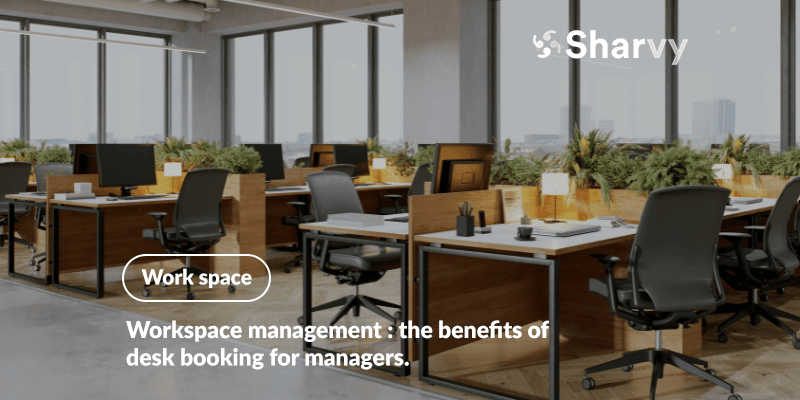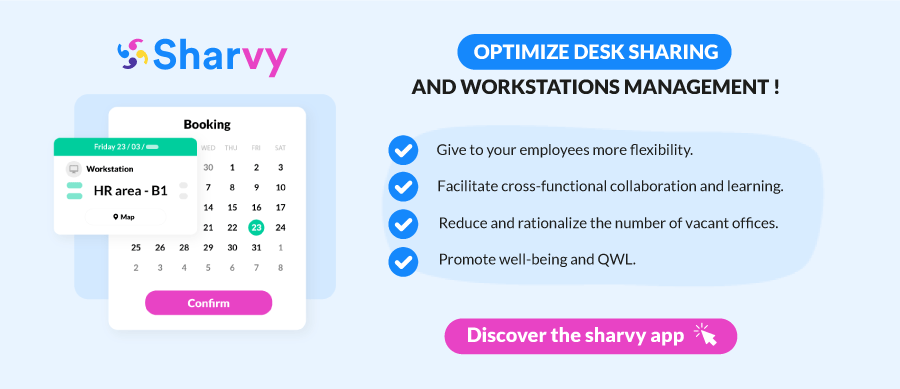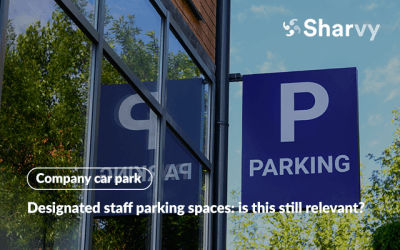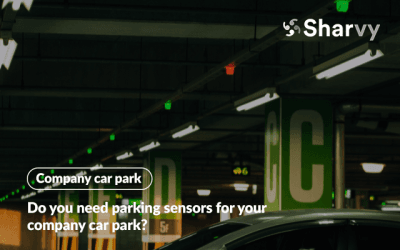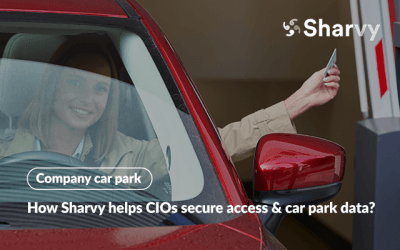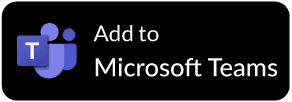Today’s office no longer looks like yesterday’s: sometimes busy as a beehive in the middle of the week, sometimes deserted as the weekend approaches. For managers, this constant fluctuation in presence is becoming a real headache.
How can they make the most of each space, avoid unnecessary vacuums & give their teams clear points of reference? Desk booking provides an answer to these major challenges.
By intelligently organising the booking of workstations, you can optimise the occupation of premises, make tangible savings (if this is one of the company’s wishes), and restore fluidity and serenity to day-to-day organisation.
And what if, in the end, the promise of a harmonious environment lay in the subtle art of office booking? Focus in this article.
Workspace management in 2025: where do we stand?
In 2025, office management is no longer seen as a simple property issue. It has become a genuine strategic lever in the service of managerial performance, attracting the right talent, strengthening cohesion & offering a work experience that lives up to expectations.
In this sense, the office is no longer simply a place where people come to work: it lives at the pace of the teams, modulating itself according to their needs, and reinventing itself as a place of connection and creativity.
This has given rise to 3 major trends:
- Hybridization as a new norm : the office is no longer the centre of activity, but a space that complements teleworking. Employees come here to find what they can’t find at home: collaboration, inspiration and social interaction.
- Data at the heart of decision-making : managers now rely on Workplace Analytics tools to monitor occupancy in real time. This data enables them to anticipate needs, adjust space configuration and optimise costs, without sacrificing team comfort.
- Employee experience as a priority : workspaces must be places of experience. Offices must be pleasant, easy to book and easy to use.
What is desk booking?
Desk booking is a digital solution that allows employees to choose and reserve their workstation in advance, directly from an application, like an online portal.
But its real strength is the strategic visibility it offers managers.
Unlike hot desking in some companies, where everyone sits down at random according to availability, desk booking provides structure and visibility. Each employee knows where he or she will be working, teams can organise themselves more easily, and managers finally have a precise map of the occupation of spaces.
In other words, desk booking is not just a simple reservation tool: it’s a veritable orchestra conductor for the workspace, aligning individual needs with collective objectives. Solutions like Sharvy are a perfect illustration of this: simple to deploy, but hugely effective in giving managers back control of their workspaces.
The benefits of desk booking for managers.
If desk booking is winning over more and more companies, it’s because it doesn’t just make employees’ day-to-day lives easier. For managers, it is becoming a genuine management tool. Here are the 3 most striking benefits.
1. Clear visibility of space occupancy.
Let’s be honest: managing a hybrid team without visibility of actual presence is like flying blind. Managers spend too much time guessing who’s going to be in the office, juggling incomplete diaries, and then discovering the very morning that a face-to-face meeting is taking place in an empty open space.
It’s true that desk-booking is a game-changer in this respect.
It’s not just about « knowing who will be there », it’s about having a real-time dashboard that enables you to anticipate, plan and organise your management in a fluid way.
Managers can put the right people together at the right times, avoid unnecessary travel and, above all, stop wasting energy managing the unpredictable.
Admittedly, some people criticise the risk of excessive control. But the real value for a manager is not in keeping an eye on his staff: it’s in gaining a clearer picture so that he can organise his team more flexibly. Where yesterday everything was based on improvisation and informality, desk booking offers a light, but highly effective structure.
Our point of view? The visibility offered by desk booking is not about control, it’s about peace of mind. It means managers can finally concentrate on their role: supporting, uniting and deciding, rather than chasing after exhausting logistics.
2. An improved employee experience thanks to desk booking.
Every manager knows: the employee experience is not just about HR rhetoric.
It’s all about the day-to-day details: and it’s often these details that undermine team dynamics.
An employee who settles in alone (because there’s no space near his team), an informal meeting that falls through because everyone is scattered, a new arrival who spends his first few days wandering around looking for an office… All these little situations add up to frustration, wasted time and demotivation.
So who has to deal with these irritations? The manager. It’s the manager who collects complaints, soothes tensions and reorganises as best he can to maintain cohesion. In other words: precious energy wasted on invisible logistics, when it could be devoted to high value-added tasks.
What do we think? When we talk about employee experience, we often forget that the first beneficiaries of better organisation are the managers. Every irritation avoided, every conflict extinguished before it erupts, is time and energy given back to the manager’s real role. So desk-booking is not just a convenience for teams, it’s a way of lightening the daily burden on managers.
3. Desk booking: a decision-making tool.
Let’s be frank: having figures on office occupancy doesn’t guarantee better decisions if managers don’t know how to interpret them, and if they don’t integrate them into a more global vision! And too much data can even blur the message, complicating decision-making rather than clarifying it.
However, when used properly, the information provided by desk booking solutions becomes a real asset for managers.
Who will be present, when, where the teams are: all this information makes it possible to make informed choices, to reorganise groups according to needs, and even to anticipate peaks in activity before they become a problem.
Our point of view? Far from being a simple gadget, desk booking is a genuine tool for empowering managers. It allows you to anticipate and steer with precision, reducing the stress associated with the unexpected and freeing up mental energy for what really matters: making the right decisions for your team.
5 best practices for successful desk booking.
To successfully implement desk booking, involve your teams from the outset. This is essential. Explain why every booking counts, how it makes day-to-day work smoother and helps avoid empty desks and overcrowded open spaces.
Of course, make sure that the tool is simple and intuitive, so that booking becomes a reflex and not a constraint.
Thirdly, make the most of the data collected: it can be used to identify peaks in occupancy, to reorganise teams and to forecast service requirements (catering, premises maintenance, etc.).
Then test, adjust and communicate regularly. Employee feedback on ergonomics and functionality can turn a useful tool into a real ally.
Finally, it should be noted that desk-booking is not a universal solution: it is particularly effective in hybrid companies, with dispersed teams and variable office use.
For small organisations, the investment may seem superfluous, or even a burden on processes.
In conclusion
In reality, desk booking is not just a matter of technology, but a management philosophy.
It expresses a posture: that of managers who choose to anticipate rather than endure the complexity of hybrid working. In a fast-moving environment where improvisation has no place, equipping yourself with a solution like Sharvy means giving yourself the means to regain control with agility.
But beware: the value is not in the tool itself, but in the way managers use it, in their ability to transform the data into informed decisions and levers of cohesion for their teams.
Basically, desk booking doesn’t replace the role of the manager, it enhances it by giving them more time and peace of mind to concentrate on what’s important.
Do you have a question? Check out the following FAQ!
Desk booking: is it really useful if my company is not looking to reduce its office space?
Yes, desk booking is not just about rationalising square metres. It also enables managers to anticipate attendance better, improve coordination and streamline collaboration, even without reducing surface area.
It’s also a way of providing greater clarity and fairness: everyone knows where they’re going, and managers gain greater visibility so they can organise hybrid working with peace of mind. In short, usefulness depends not just on the square metres saved, but on the quality of day-to-day management.
How can we prevent the tool from becoming a form of disguised surveillance?
It all depends on how you introduce it. The key is transparency. Desk booking must be presented as a tool for organisation, not control. The data is aggregated and used to better manage spaces, not to track individual employees.
What is the difference between a good and a bad desk booking tool?
A bad tool complicates life: cumbersome interfaces, inflexible reservations, data that’s difficult to use… The result: low adoption and frustrated teams.
A good tool is simple, intuitive and brings immediate value to managers. It doesn’t complicate life, it simplifies it. At Sharvy, for example, the emphasis is on ease of use and intelligent use of data.
Want to find out more? Check out our latest articles to stay up to date!
Designated staff parking spaces: is this still relevant?
Are designated staff parking spaces still relevant in the remote-working era? What are the limitations? Focus!
Do you need parking sensors for your company car park?
Are parking sensors a worthwhile investment or just a technological luxury for your company’s parking lot? Let’s take a closer look!
How Sharvy helps CIOs secure access & car park data?
Why are access security & corporate car park data a critical issue for CIOs? How can Sharvy help? Focus in this article!
Subscribe to our newsletter!
PARKING & WORKPLACE MANAGEMENT SOLUTION
Car park management - Charging points monitoring - Desk booking - Booking by time slots
SUBSCRIBE TO THE NEWSLETTER
Receive the latest Parking & Workplace trends by email once a month.

